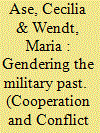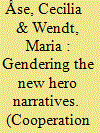| Srl | Item |
| 1 |
ID:
181533


|
|
|
|
|
| Summary/Abstract |
This article showcases how a feminist perspective provides novel insights into the relations between military heritage/history and national security politics. We argue that analysing how gender and sexualities operate at military heritage sites reveals how these operations dis/encourage particular understandings of security and limit the range of acceptable national protection policies. Two recent initiatives to preserve the military heritage of the Cold War period in Sweden are examined: the Cold War exhibits at Air Force Museum in Linköping and the redevelopment of a formerly sealed off military compound at Bungenäs, where bunkers have been remade into exclusive summer homes. By combining feminist international relations and critical heritage studies, we unpack the material, affective and embodied underpinnings of security produced at military heritage sites. A key conclusion is that the way heritagization incorporates the ‘naturalness’ of the gender binary and heterosexuality makes conceptualizing security without territory, or territory without military protection, inaccessible. The gendering of emotions and architectural and spatial arrangements supports historical narratives that privilege masculine protection and reinforce a taken-for-granted nativist community. A feminist analysis of military heritage highlights how gender and sexualities restrict security imaginaries; that is, understandings of what is conceivable as security.
|
|
|
|
|
|
|
|
|
|
|
|
|
|
|
|
| 2 |
ID:
157796


|
|
|
|
|
| Summary/Abstract |
During the 20th century, wars were fought primarily in the name of protecting the homeland. Making the ‘ultimate sacrifice’ was a national masculine duty and a key feature of military heroism. Today, human rights and international values justify war-making and legitimise military action. In one of these post-national wars, the International Security Assistance Force operation in Afghanistan, more than 700 European soldiers have lost their lives. How have these deaths been legitimised, and how has the new security discourse affected notions of masculinised heroism and sacrifice? This article investigates how the dimensions of national/international and masculinity/femininity are negotiated in media narratives of heroism and sacrifice in Denmark and Sweden. Regarding scholarly discussions on the professionalisation, individualisation and domestication of military heroism, the empirical analysis demonstrates that the Danish/Swedish nation remains posited as the core context for military heroism and sacrifice. In the media narratives, professionalism is represented as an expression of specific national qualities. The media narratives conflate nation and family and represent military heroes as distinctively masculine and national figures. It is argued that a family trope has become vital in present-day hero narratives. This trope is disposed towards collective emotions, national loyalty and conservative gender ideals.
|
|
|
|
|
|
|
|
|
|
|
|
|
|
|
|